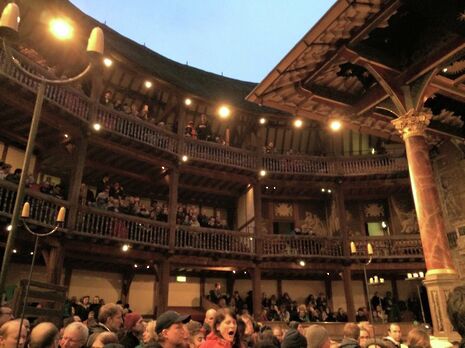A Trip to the Globe: Shakespeare’s King John
Genevieve Cox is spell-bound by the opening night show of one of Shakespeare’s lesser-known plays

‘All the world’s a stage…’ (As You Like It, II.VII) As perfectly depicted in Shakespeare’s own well-known words, the atmosphere at The Globe on Friday was exactly that. As the world around gathered into darkness, the light of the stage gradually replaced the sun, providing all sources of illumination and drawing the audience into its realm, making them part of the stage-world and ultimately creating a new reality whereby the stage, the world and all its players became the sole tangible definition of a unique kind of ‘globe’. As it shone, the night and painted stars in the sky, the stage and the staged became the real and the reality. Ingenious manipulation of both natural and artificial lighting effectively drew the audience closer and closer into the action of the play. As one can lose oneself in a good book, so one could watch and lose oneself in this performance.
I have to admit a pre-existing anxiety towards the effectiveness of a night-time performance at The Globe. As a member of the ‘groundling’ audience, would I be able to see? Would I be able to hear? Would it be too cold? Too wet? Too dark? Would standing get tiring, or claustrophobic, or boring? Yet my fears were proven irrational and unnecessary in what proved to be a spectacular recreation of King John in the very home of Shakespeare. The setting of The Globe not only brought to life the action of the play, but also enabled authentic reimagining of the individual, contemporary experience of The Globe. Engagement with the audience aided this success as the crowd reacted to both comic and tragic elements that were brought to life by interactive drama, a method parallel to Shakespeare’s own dramatic performances that blurred the lines of meta-theatricality
The encapsulation of the audience into the dramatic world was not only prevalent visually through lighting and staging of fights, but also audibly. Actors mingled with the crowd, shouting from platforms, calling from the galleries, and chanting throughout. The echoing refrain of ‘war for war and blood for blood’ served as an echoing choral effect. Its repetitive refrain structured the play and gave audience members a point of recognition, a potential to join in the chant, to feel a sense of belonging within the theatrical world. Moreover, it bound together the central concerns of the play: legitimacy of lineage that was solved through both war and blood ties in the sense of both familial and marital union. It served to effectively draw upon and centralise thematic tensions of the play; it embodied the prevalent themes of legitimacy, heirs and succession, enhancing them through audial (as well as visual) presentation.
The production brought to life the thematic significance of the play, but also the very words of Shakespeare’s original text in brilliant emphasis on the iambic pentameter that not only made it comprehensible to the wide-ranging audience, but also added new meanings and interpretations of consequential humour. Refreshing interpretation of individual words and speeches was furthered through brilliant characterisation, especially the decision to double up on the actor playing Arthur and Henry to enable a sense of legacy and continued heritage. Phenomenal stage directions also contributed to make up a truly spectacular performance that merged tragedy, comedy and history.
A fantastic experience that brought to life Shakespeare’s text with innovative techniques, talented actors and efficient directing, in the very centre of Shakespeare’s London, in the heart of Shakespeare’s recreated Globe.
 News / Police to stop searching for stolen Fitzwilliam jade17 April 2024
News / Police to stop searching for stolen Fitzwilliam jade17 April 2024 News / Copycat don caught again19 April 2024
News / Copycat don caught again19 April 2024 Interviews / ‘It fills you with a sense of awe’: the year abroad experience17 April 2024
Interviews / ‘It fills you with a sense of awe’: the year abroad experience17 April 2024 News / Night Climbers call for Cambridge to cut ties with Israel in new stunt15 April 2024
News / Night Climbers call for Cambridge to cut ties with Israel in new stunt15 April 2024 News / Acting vice-chancellor paid £234,000 for nine month stint19 April 2024
News / Acting vice-chancellor paid £234,000 for nine month stint19 April 2024




